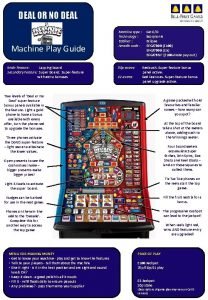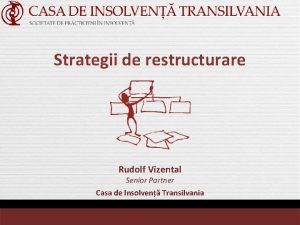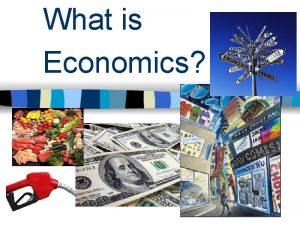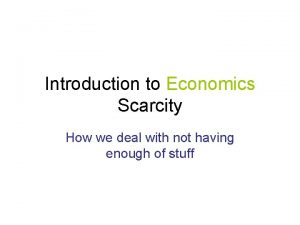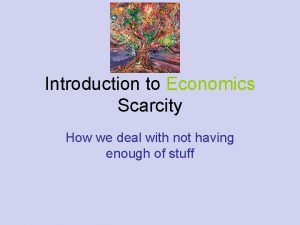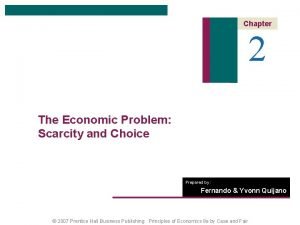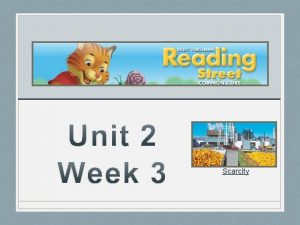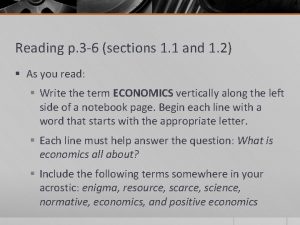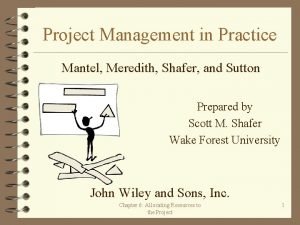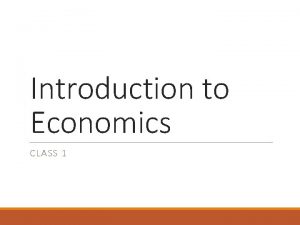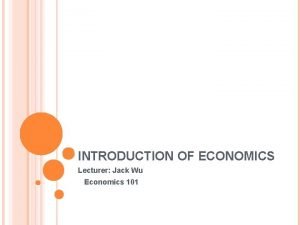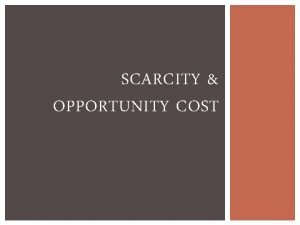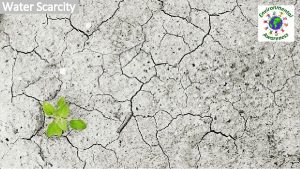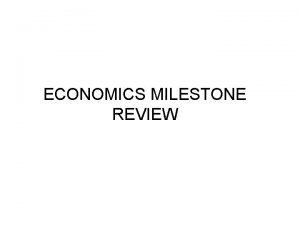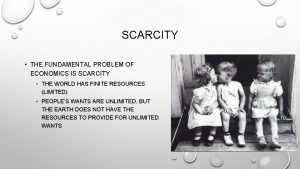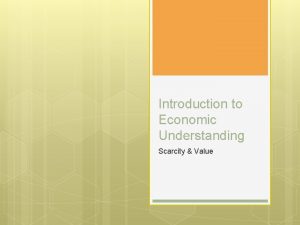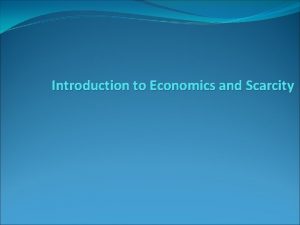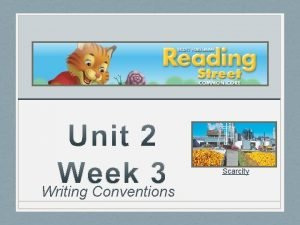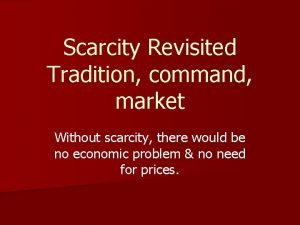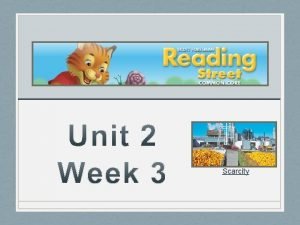Introduction to Economics Scarcity How we deal with




















- Slides: 20

Introduction to Economics Scarcity How we deal with not having enough of stuff

Food for thought! • By graduating from high school, how much more money will you make than someone who doesn’t graduate over your lifetime? • $283, 500, or about $9, 500 a year!

More food for thought! • By graduating from college, how much more money will you make than someone who doesn’t graduate from high school over your lifetime? • $918, 000 or about $30, 000 a year!

What is Economics? • Def. The study of how people satisfy their needs and wants. • We tend to use money to purchase our needs and wants. Bartering (trading one thing for another) and making yourself are other methods.

What are NEEDS? • Needs are things that a person has to have to survive. – Food – Water – Shelter – The BARE NECESSITIES!

What are WANTS? • Wants are those things that you would like, but do not need to survive. • Ex. Car I-Pad Concert Tickets

Scarcity Def. A limited amount of resources to meet unlimited wants and needs. EVERYTHING is scarce!

Why do we have Scarcity? We have Unlimited Wants and Needs But Limited Resources Create Scarcity So we need to make Choices What to produce, How to Produce, For Whom to produce (tomorrow’s lesson)

Causes of Scarcity 1. Personal Perspective: your own feelings of what is needed or wanted. – “I’m starving!” – “I’m broke!”

Causes of Scarcity (cont. ) 2. Poor Distribution of Resources: not using your resources to their potential. – “I never have any time- yet I watch 6 hours of television a day!!” – “I don’t have enough money for college, but I have to have a pair of $200 sneakers!”

Causes of Scarcity (cont. ) 3. Rapid Increase in Demand: A sudden rush to use resources can cause a shortage. – Tickle Me Elmo – X-Box – Beanie Babies

Ways we deal with Scarcity 1. Doing without something – “Shut up kid- you’ll get nothing and like it” – “I’ll go to the prom, but not on the senior trip” – “Instead of driving to theater, let’s watch a movie on cable and save gas money”

Ways we deal with Scarcity (cont. ) 2. Creating more resources – “I’ll get a second job” – “We’ll drill for more oil in Alaska”

Ways we deal with Scarcity (cont. ) 3. Making better use of our resources – “While I watch television, I’ll grade papers” – “I’ll take my date to a matinee movie and use a buy one get one free coupon for dinner!” – “If we carpool to work, it’ll save gas money”

Real Costs • Def. All of the resources used to produce a good or service. • Most resources can be used for only one thing at a time.

Example of Real Costs • Real costs of building a bridge instead of a building – Construction workers (cannot work on building a new building) – A crane (cannot be used to build a new building) – Steel (used in the bridge, cannot be used in a new building)

Trade Offs Def. When you choose between two possible uses for a resource, giving up one alternative for another. Ex. Bridge vs. Building I can either buy this book or pizza, but not both.

Opportunity Costs • When you make a trade off, there are costs. The value of time, money, goods, and services given up in an economic choice. The #1 alternative is the Opportunity cost. • By doing this, I give up the opportunity to do that. – If we build the bridge, we can’t build the building. – If I buy the pizza, I can’t buy the book.

Trade off: Sleep vs. Study Options Benefit Opportunity Cost 1 hour of extra Grade of C on study time test 1 hour of sleep 2 nd hour of extra study time 3 rd hour of extra study time 2 hours of sleep Grade of B on test Grade of B+ on 3 hours of test sleep

What is the Opportunity Cost of Going to College? • Benefits – Higher Income – More Job opportunities – Job opportunities in a career I enjoy – Job opportunities in more places • Opportunity Costs – Costs a LOT of money – Student loans for years – 4 (or more) years of school – No guarantee of a job when I get out – What if I change my mind?
 Opportunity cost
Opportunity cost The basic economic problem results from scarcity.
The basic economic problem results from scarcity. Take home pay
Take home pay Deal or no deal machine
Deal or no deal machine Rudolf vizental
Rudolf vizental Maastricht university school of business and economics
Maastricht university school of business and economics Econ213
Econ213 People with all their efforts, abilities, and skills
People with all their efforts, abilities, and skills Scarcity lesson plan
Scarcity lesson plan Opportunity costs and trade offs
Opportunity costs and trade offs Causes of scarcity
Causes of scarcity The economic problem of scarcity
The economic problem of scarcity Scarcity, choice and opportunity cost example
Scarcity, choice and opportunity cost example Scarce sentence
Scarce sentence Scarcity forces tradeoffs symbol
Scarcity forces tradeoffs symbol Scarcity entrepreneurship definition
Scarcity entrepreneurship definition Scarcity
Scarcity Resources scarcity
Resources scarcity Resources scarcity
Resources scarcity Resources scarcity
Resources scarcity Resources scarcity
Resources scarcity



